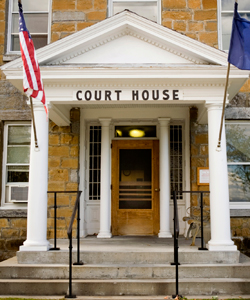
Feb. 15, 2012 – A new law took effect on Nov. 24, 2011, altering where plaintiffs suing the state may bring those actions and where an appeal may be heard arising out of those actions.
The author of the legislation, Sen. Leah Vukmir (R), explained that the legislation, enacted as 2011 Wisconsin Act 61, was drafted to provide “wider access to the court system for citizens who wish to take up an action against the State of Wisconsin” and because citizens should have the right to bring an action “closer to where they live.”1
Other proponents, like Rep. Bill Kramer (R), have remarked that the bill was offered in response to the recent turmoil of the past year in Madison.2
Whatever the law’s intended purpose, it was immediately put to use in a suit filed in Waukesha County challenging the method used by the Governmental Accountability Board (GAB) for reviewing signatures on recall petitions against the governor and targeted legislators.
Waukesha County Circuit Court Judge Mac Davis issued an order requiring the GAB to more carefully scrutinize signatures for duplicates and fake names instead of relying on the campaigns to challenge individual signatures. [Editor’s note: The Waukesha County Circuit Court order was vacated by a recent decision of the District IV Court of Appeals.]
Would “a Dane County judge” have ruled differently? Who knows? But there is no question that this law – which was little-noticed when it was signed into law by Gov. Scott Walker in early November – is bringing politically charged lawsuits to counties where residents are more likely to sport “Stand with Walker” bumper stickers than “Stand with Wisconsin” lapel buttons.
Here is a brief look at the law.

Wisconsin Act 61
This new law does not require plaintiffs to sue the state in Dane County any longer. Rather, it provides that “all actions in which the sole defendant is the state, any state board or commission, or any state officer, employee, or agent in an official capacity shall be venued in the county designated by the plaintiff unless another venue is specifically authorized by law.”3
This means that a plaintiff can file its action against the state in any county, including counties having no connection to the defendant, the plaintiff, or the cause of action.
If plaintiffs choose, they still may bring the action in Dane County. However, the new law does not change venue rules for actions brought by prisoners against the “state, any state board or commission, or any state officer, employee, or agent in an official capacity.”4 Those actions still must be brought in Dane County.
Impact on appeals
The law also changed the venue rule for appeals from circuit court cases. Turning the rules on their head, these appeals may not be heard in the court of appeals district that contains the court from which the judgment or order is appealed.
Now, the appeal from an action against the state “shall be heard in a court of appeals district selected by the appellant, but the court of appeals district may not be the court of appeals district that contains the court from which the judgment or order is appealed.”5
In short, an appellant must file its appeal in one of the three other court of appeals districts. Similar to Wis. Stat. section 801.50(3)(a), the chosen district does not need to have any connection to the parties or the matter.
The pros and cons
There are quite a few arguments that can be made for and against the law. Most seem to arise from concerns about the fairness of the new law, and the cost and practicality of following the new rules.
Fairness. Advocates of the law may assert that the old law requiring lawsuits against the state to be heard in Dane County was not fair to Wisconsin residents who did not live in Dane County. Because only Dane County residents vote for the judges hearing lawsuits against the state, under the old law, a resident living outside of Dane County had no “say”; in who the judges were that would be reviewing their claims.
Proponents of the law argue that the ability to elect judges in Dane County gave those Dane County residents too much power because they picked judges who hear issues of statewide importance, not just issues relating to Dane County. The new law remedies this imbalance.
On the other hand, the new law is considered unfair by some because a defendant can be forced to distant counties to defend a lawsuit. The new law allows plaintiffs to file a lawsuit against not only the state but any individual employee of the state.
Theoretically, an individual could be sued in any one of the 72 counties statewide. This is unlike expected notions of venue that require that a lawsuit be filed in a place having some connection to the defendant, its business, or the cause of action. The new law requires no nexus to the defendant, the claims, or even to the plaintiff.
Practicality. As a practical matter, opponents believe that it will be unduly expensive for the government or its agents to have to defend itself in any county in the state. The cost to taxpayers of defending the state against such suits will go up, as attorneys working for state agencies based in Madison will be forced to litigate all over the state. For better or for worse, Dane County judges have developed expertise in areas of law relating to actions against the state, which judges in other counties may not have developed. The expertise of Dane County judges has allowed actions against the state to proceed in a more efficient and orderly fashion.
Proponents point out that lawsuits will not automatically be more expensive as a result of the new law. Many cases settle prior to trial, eliminating the need to spend days to weeks in a distant location for trial. Briefing and discovery, which take a great deal more time than court appearances, do not typically take place where the court is located anyway, and the cost for those aspects of the case should not be increased substantially.
Appeals. Proponents of the law believe that this will create a system of checks and balances and prevent cronyism. By having judges from court of appeals districts other than where the circuit court is located, it will prevent plaintiffs from forum shopping because any appeal would be heard elsewhere by judges further removed from the action. However, the change may create a procedural headache for those filing appeals, the clerk’s office, and judges.
Why Now?
Beyond the belief that citizens should have fuller access to the courts in actions against the state, the question remains why this legislation was important now.
Suits relating to the hotly contested recall against Gov. Walker, including the lawsuit most recently involving the GAB, immediately come to mind. Whether the law will have any influence on such actions will surely be debated. However, the law is something for all litigators and appellate specialists to be aware of as it marks a significant change in the current venue rules in actions against the state.
About the author
Erin O’Connor focuses her practice on state and federal appeals and is an Adjunct Professor at Marquette Law School. She is a graduate of the University of Michigan Law School where she was the Editor in Chief of the Michigan Journal of International Law and is a former law clerk to Judge James L. Ryan (ret.) of the United States Court of Appeals for the Sixth Circuit. Prior to joining the Wisconsin Bar, she was a commercial litigator with Skadden, Arps, Slate, Meagher & Flom in Chicago.
This article is published courtesy of the February 2012 State Bar Appellate Practice Section De Novo newsletter. The State Bar offers its members the opportunity to network with other lawyers who share a common interest through its 26 sections. Section membership includes access to newsletters, email lists to facilitate information sharing, and other resources.
Endnotes
